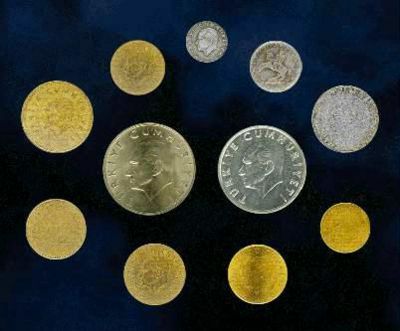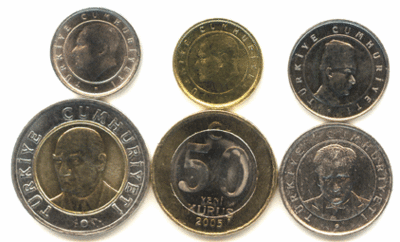土耳其裡拉
出自 MBA智库百科(https://wiki.mbalib.com/)
土耳其裡拉(Turkish Lira/Turkish New Lira,又稱土耳其鎊Turkish Pound 原符號:£T. (TL.) 標準符號:TRL ISO 4217現行通用三位字母代碼:TRY)
土耳其裡拉——躍居金氏紀錄最不值錢貨幣
目錄 |
土耳其裡拉也稱鎊(Pound),由土耳其共和國中央銀行 (The CentraI Bank of the Republicof Turkey)發行。
土耳其史稱突厥。14世紀初建立奧斯曼帝國,20世紀淪為英、法、德等國的半殖民地,1923年10月29日成立土耳其共和國。1840年土耳其帝國第一次發行了500庫魯手繪利息為12.5%的票據,同年第二次發行的面額有1000、500、250、100和50庫魯。第三次發行是1841年和 1843年。第四次是1851年發行的、利息為6%的票據,面額有10000、5000、2000、1000、250、100和50庫魯。從1840年到1861年共發行過8次。土耳其帝國銀行依據1862年2月6日、1912年3月30日、1912年12月16日、1912年12月22日、1913年3 月2比1913年8月6比1913年2月4日、1914年3月28日和1915年3月28日等法令發行過鈔票。如1933年,曾發行過面額為100、 50、5和1鎊鈔票。土耳其共和國成立後,於1926年發行過面額為1000、500、100、50、10、5和1裡拉鈔票。土耳其中央銀行(Tukiye CumhriyetMer Bankasi)發行第一版鈔是依據1930年1月30日中央銀行法,於1937年至1942年發行的。面額有1000、500、100、50、10、5、2.5和1裡拉和50庫魯鈔票。第二版鈔是1942年至1947年發行的,面額有1000、500、 100、50、10、2.5裡拉;第三次發行是1947年和1948年,面值為100和10裡拉;第四次是1952年至1968年,第五次發行是在 1966年和1968年;第六次發鈔是1971年至1981年,面額有5000、1000、500、100、20、10和5裡拉;第七次發行是1984年至1989年,面額有50000、20000、10000、5000、1000、500、100、10裡拉。1991年發行了100000裡拉鈔票。
1947年6月3日,初次規定土耳其裡拉含金量為0.317382克,同年6月19日起生效。法定匯率為 2.80裡拉等於1美元,11.28裡拉等於1英鎊。1960年8月20日,裡拉含金量減至0.0987412克,法定匯率為9裡拉等於1美元, 25.20裡拉等於1英鎊。1970年8月9日,裡拉含金量減至0.0592447克,法定匯率隨之變動。1972年6月23日,英鎊浮動後,土耳其裡拉兌英鎊匯率隨時調整。1975年7月8日起,對美元貶為14.25裡拉等於1美元,並實行自由浮動,但仍以美元作為干預貨幣,對其他主要貨幣,隨時根據美元匯率進行調整。1986年10月31日,官方規定裡拉的買賣差價為0.5%。裡拉兌美元的匯率由土耳其共和國中央銀行根據每日外匯市場行情確定,兌其它貨幣的比價則由外匯市場美元兌其它貨幣匯率套算確定。
2001年初土耳其央行曾計劃發行新的紙幣,新幣的面額1土耳其裡拉相當於原來的100萬土耳其裡拉。央行總裁森丹傑契提卻表示,惟有在通貨膨脹率降至一位數以下時,央行才會考慮這樣做。但2001年9月以來,土耳其通貨膨脹率已超過70%,因此上述想法只能作罷。
2001年11月11日土耳其中央銀行宣佈,市場上面額1000萬的土耳其裡拉鈔票流通率已超過80%,央行決定在11月底之前發行面額2000萬土耳其裡拉的鈔票,它成為全球面額最大的鈔票。以匯率1美元兌160萬土耳其裡拉計算,2000萬土耳其裡拉,約合12.5美元。領取最低工資的土耳其工人,每月可領到7張2000萬土耳其裡拉的紙幣。
據2001年金氏紀錄大全記載,土耳其裡拉是全世界“最不值錢的貨幣”,以2000年5月份世界各國的幣值比較,1美元等於61萬5千土耳其裡拉,臺幣1元約等於2萬土耳其裡拉。
2004年10月25日土耳其中央銀行首次向公眾公開了於2004年12月正式發行的新貨幣——“新土耳其裡拉”紙幣。
新貨幣包括“1新土耳其裡拉”、“2新土耳其裡拉”、“5新土耳其裡拉”、“10新土耳其裡拉”、“20新土耳其裡拉”、“50新土耳其里 拉”和“100新土耳其裡拉”紙幣。新幣正面均印有土耳其國父穆斯塔法·凱末爾·阿塔圖爾克的肖像,背面畫像各不相同,顏色也不一樣。土耳其還將發行1、2、5、10、25、50小貨幣單位的“庫魯什”硬幣。
土耳其大國民議會2004年早些時候通過了一項法案,同意財政部於2005年1月1日起開始流通“新土耳其裡拉”,以取代現在的“土耳其裡拉”。“1新土耳其裡拉”等於現在的“100萬土耳其裡拉”。 而面值100的新“庫魯什”硬幣相當於“1新土耳其裡拉”。
根據有關規定,“新土耳其裡拉”於2005年1月1日開始使用。新舊土耳其裡拉過渡到2005年12月31日為止。隨後,舊土耳其裡拉停止使用。
紙幣有:100000、50000、20000、10000、500、1000裡拉
新貨幣包括:1、2、5、10、20、50和“100新土耳其裡拉”
鑄幣有:100、50、25、 20、10、5、1裡拉和1、 2、5、10、25、50小貨幣單位的“庫魯什”
1裡拉等於100庫魯(Kurus)。
1土耳其裡拉 = 5.73048622 × 10-6 人民幣
Old Turkish Lira
Up until 2005 the Turkish currency was the Turkish lira or in Turkish; Türk lirası, it was often referred to as just lira but almost always referred to as the Turkish lira outside Turkey, to avoid confusion with the better-known former Italian lira. Prices in Turkey is old lira were usually written using the abbreviation TL, which preceded the price, The ISO 4217 code for the old Turkish lira was TRL.
The gold lira was introduced in 1843, weighing 7.216 g with a fineness of 91.67%, that is, 6.6 g of gold. In a bimetallic system, it was defined as equal in value to 100 silver kuruş of 1 g of silver (1.2027 g at 83%), first minted in 1844, at a ratio of 15.09. Each kuruş was divided into 40 para. There were 5, 10, and 20 kuruş coins; the 20-kuruş coin was called a mecidiye. All coinage minted until 1922 followed these standards.
Before the lira, the monetary unit used by the Ottoman Empire was first the akçe, later to be replaced by the kuruş (piastre), with the para as a subunit (1 para being equal to 3 akçe, thus 1 kuruş equal to 120 akçe). Having begun as a large silver coin, by the late 1800s the kurus had shrunk to a small silver coin.
The Banque Imperiale Ottomane (Imperial Ottoman Bank) first issued paper currency denominated in kuruş, with values ranging from 5 to 5000 kurus. The denomination switched from kuruş to lira in the mid 1870s. Denominations ranged from 5 kuruş to 1000 lira, with the 50,000-lira banknote specially prepared to fund the issue of small change (1- and 2½-kurus) notes.
World War I saw Turkey effectively depart from the gold standard with the gold lira being worth about nine lira in paper money by the early 1920s.
The Turkish Republic replaced the older imperial Ottoman paper liras with the Turkish lira being reissued as a mid size silver coin. Turkish lira notes were also introduced in denominations of 1, 2½, 5, 10, 50, 100, 500 and 1000 lira. Each note carried the portrait of Mustafa Kemal Atatürk.
After Atatürk's death in 1938, new notes were prepared with the portrait of President İsmet İnönü. Atatürk reappeared on a subsequent series of notes in the early 1950s.
Chronic inflation from the late 1970s onward saw the Turkish lira sharply depreciate against other major currencies. The table below gives a snapshot of the decline in the value of the Turkish lira against the United States Dollar from 1933 through 2001.
YEAR Turkish Lira vs. US Dollar
1933 2 Turkish Lira
1966 9 Turkish Lira
1980 90 Turkish Lira
1988 1,300 Turkish Lira
1995 45,000 Turkish Lira
2001 1,650,000 Turkish Lira
The Turkish lira slid in value to such an extent that one original gold lira coin could be sold for approximately 120,000,000 Turkish lira prior to the 2005 revaluation.
In its last few years the Turkish lira stabilized and even rose against the U.S. dollar and the Euro. In December 2004, it traded at about 1,350,000 lira to 1 U.S. dollar, and about 1,850,000 lira per Euro. The Guinness Book of Records ranked the Turkish lira as the world's least valuable currency.
New Turkish Lira "Yeni Türk Lirası"
The new Turkish lira is the current currency of Turkey and of the de facto state of the Turkish Republic of Northern Cyprus. Introduced on 1 January 2005, it is equivalent to 1,000,000 old Turkish lira. New banknotes were issued denominated in New Turkish Lira, the old banknotes circulated alongside the new currency for all of 2005. Old Turkish lira banknotes were legal tender until the end of 2005, and may be exchanged at the Central Bank until the end of 2015. The new Turkish lira is divided into 100 new kuruş. The ISO 4217 code for the new Turkish lira is TRY. Prices are expressed using the abbreviation YTL, which short for "Yeni Türk Lirası", Turkish for "New Turkish Lira"
Banknotes are currently issued in denominations of 1 YTL, 5 YTL, 10 YTL, 20 YTL, 50 YTL and 100 YTL. The Bank of Turkey has indicated that it has plans to issue a new 200 YTL banknote, although the new denomination is not expected for a couple of years. It is also planned to drop the word "New" from the currency name in 2009.
Coins currently in circulation come in denominations of 1, 5, 10, 25, 50 new kuruş, and 1 YTL. The design of the 50 kuruş and 1 lira coins, much to the dismay of the European Central Bank, clearly resembles that of the one and two euro coins respectively. This has caused confusion in the euro zone. Also, it has caused trouble to businesses using vending machines, particularly at airports in the euro zone. Since numerous vending machines at the time accepted the 1 lira coin as a two euro coin, vending machines affected had to be quickly upgraded at the expense of the operators. Two euros is worth roughly four times more then a 1 lira coin.
Banknotes denominated in New Turkish Lira (2005 - Present)
The new Turkish lira is the current currency of Turkey and of the de facto state of the Turkish Republic of Northern Cyprus. Introduced on 1 January 2005, it is equivalent to 1,000,000 old Turkish lira, which remained legal tender until the end of 2005, the new Turkish lira is divided into 100 new kuruş.


































我有張100000裡拉的紙鈔該到哪換台幣